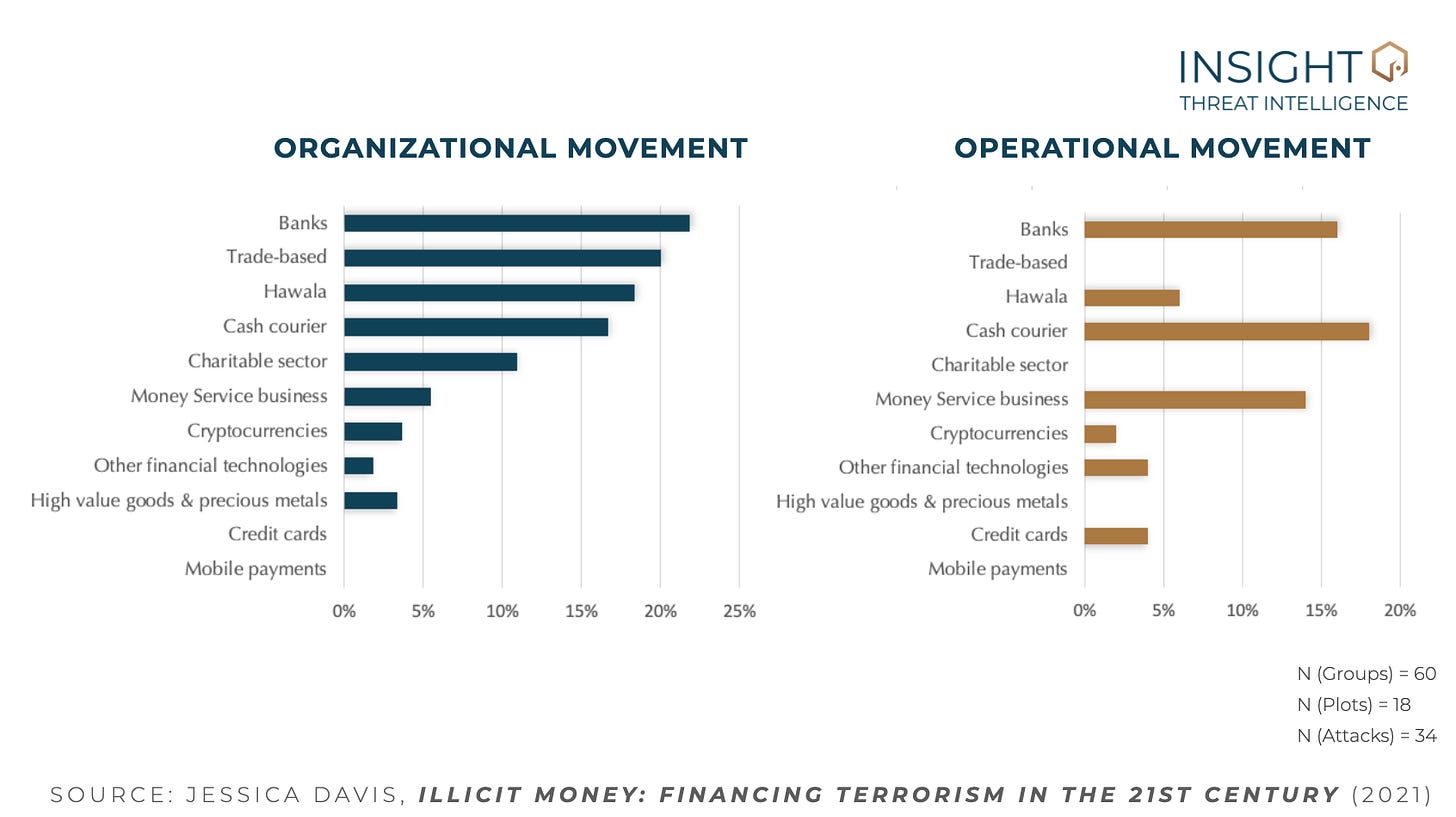The UN says up to 20% of terrorist financing cases involve crypto!
But where are they getting their numbers from?
This week, I’ve gotten a couple of questions from you folks about something that was said at a United Nations meeting discussing terrorist financing. So I’ll unpack a bit of the “behind the scenes” data for you. Spoiler: Insight Intelligence played a role in those numbers. Read on for the details, and stay to the end for a few quick polls! I want to know what you want to read, how you want to engage, and what’s stopping you from upgrading your subscription.
According to several news reports,
“A United Nations official said more cases of crypto use in terror-financing are being detected amid stepped up scrutiny of such practices. A couple of years ago 5% of terrorist attacks were viewed as crypto-financed or linked to digital assets, but “now we’re thinking that it may reach about 20%," Svetlana Martynova, senior legal officer at the United Nations Counter-Terrorism Committee Executive Directorate, said in an interview in Mumbai.”
A few of you have reached out asking how the United Nations could possibly be quantifying the use of crypto for terrorist financing. The short answer: I don’t think they are, but they’ve certainly asked me to do it! I recently spoke at a United Nations CTED event on terrorist financing where I talked about the use of crypto (and specifically about the crypto-hawala mashup happening). Here’s the summary report.
As some of you might know, I keep an updated database of terrorist financing “cases”: these include things like arrests, prosecutions, other disruptions like sanctions, or even just news reports about terrorist financing methods and trends. I use this data to track trends and issues. In my book, Illicit Money, I also quantified my observations of terrorist financing methods and trends, illustrating a baseline (2019) of crypto use:
You can see here that back in 2019 (when most of this data was being compiled), I estimated that crypto accounted for a little less than 5% of how money as moved. (I assess that funds movement is the main mechanism that crypto is used for — when groups “raise” funds from crypto, they are generally instructing donors to send money in that form. They then convert that crypto to whatever currency is more useful for them. However, some groups / actors also invest in crypto, although evidence of this is scant.)
Here’s a summary of what else I told the United Nations:
Over the course of the last few years, we’ve definitely seen an increase in the use of cryptocurrency in terrorism cases (by this I mean arrests, reporting by governments, etc). In 2020, 12% of financing cases had a crypto component. I expect this to be higher in 2021 and 2022. And remember: reporting on terrorism tends to lag by several years as cases are discovered and investigated. So I would expect this to be up to about 20% of cases, but that is also unevenly distributed across jurisdictions. The best predictor of crypto use in any given location is the overall crypto adoption by the population, and in consideration of other banking restrictions.
My data shows that other movement techniques (aside from cryptocurrency and hawala) remain highly relevant for terrorists. This means that we should not ignore existing methods and vulnerabilities to chase new ones. We need both an evidence and risk-based approach to countering the financing of terrorism, and allow data to guide our prioritization process…and let our responses be jurisdictionally appropriate.
And now for that promised poll. I’m interested in what you, readers, are interested in reading. This poll is for all of you (free subscribers and paid ones). Tell me what you want to know! Most of you by now are familiar with some of my basic offerings but a quick review: terrorist group profiles look at how a group (or sometimes movement) is financed; attack profiles do the same, but for successful or disrupted attacks; comparative analysis does a compare and contrast between two or more types of groups or attacks to identify similarities or differences; news roundups are short summaries of the news.
Let me know — as we see Twitter undergoing some changes, I’m re-evaluating my engagement & content strategy. So here’s another poll:
Finally, I’m curious: if you haven’t upgraded your subscription yet, why not?





This isn’t good people we are supposed to trust? Hate is a bad thing when people we trust are not trust worthy
https://pressprogress.ca/sympathetic-police-leaked-information-to-convoy-leaders-convoy-lawyer-testifies/?fbclid=IwAR3Dr4uVR1ApGXUUAWG1EvsQ4rLknhPapmQLWIGfZFGUJZAlYlZ5Y8sO4hk